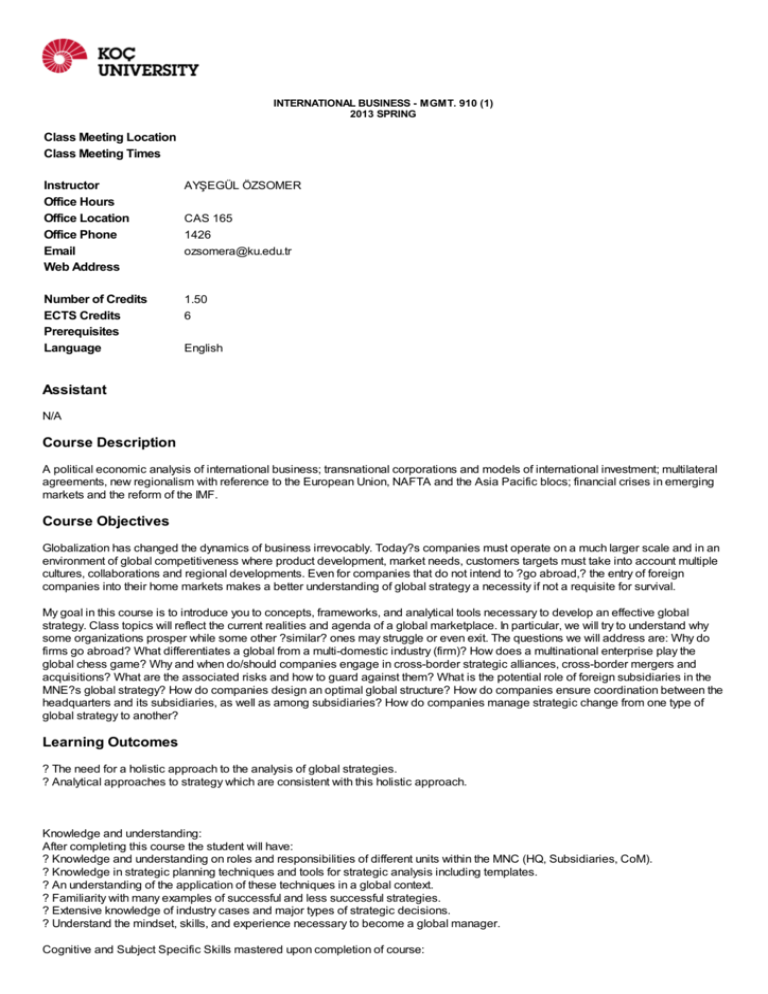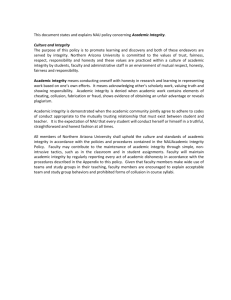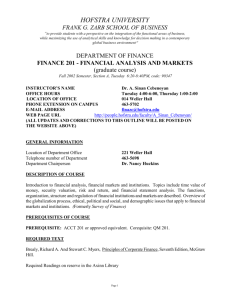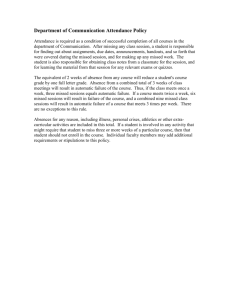Assistant Course Description Course Objectives Learning Outcomes
advertisement

INTERNATIONAL BUSINESS - MGMT. 910 (1) 2013 SPRING Class Meeting Location Class Meeting Times Instructor Office Hours Office Location Office Phone Email Web Address AYŞEGÜL ÖZSOMER Number of Credits ECTS Credits Prerequisites Language 1.50 6 CAS 165 1426 ozsomera@ku.edu.tr English Assistant N/A Course Description A political economic analysis of international business; transnational corporations and models of international investment; multilateral agreements, new regionalism with reference to the European Union, NAFTA and the Asia Pacific blocs; financial crises in emerging markets and the reform of the IMF. Course Objectives Globalization has changed the dynamics of business irrevocably. Today?s companies must operate on a much larger scale and in an environment of global competitiveness where product development, market needs, customers targets must take into account multiple cultures, collaborations and regional developments. Even for companies that do not intend to ?go abroad,? the entry of foreign companies into their home markets makes a better understanding of global strategy a necessity if not a requisite for survival. My goal in this course is to introduce you to concepts, frameworks, and analytical tools necessary to develop an effective global strategy. Class topics will reflect the current realities and agenda of a global marketplace. In particular, we will try to understand why some organizations prosper while some other ?similar? ones may struggle or even exit. The questions we will address are: Why do firms go abroad? What differentiates a global from a multi-domestic industry (firm)? How does a multinational enterprise play the global chess game? Why and when do/should companies engage in cross-border strategic alliances, cross-border mergers and acquisitions? What are the associated risks and how to guard against them? What is the potential role of foreign subsidiaries in the MNE?s global strategy? How do companies design an optimal global structure? How do companies ensure coordination between the headquarters and its subsidiaries, as well as among subsidiaries? How do companies manage strategic change from one type of global strategy to another? Learning Outcomes ? The need for a holistic approach to the analysis of global strategies. ? Analytical approaches to strategy which are consistent with this holistic approach. Knowledge and understanding: After completing this course the student will have: ? Knowledge and understanding on roles and responsibilities of different units within the MNC (HQ, Subsidiaries, CoM). ? Knowledge in strategic planning techniques and tools for strategic analysis including templates. ? An understanding of the application of these techniques in a global context. ? Familiarity with many examples of successful and less successful strategies. ? Extensive knowledge of industry cases and major types of strategic decisions. ? Understand the mindset, skills, and experience necessary to become a global manager. Cognitive and Subject Specific Skills mastered upon completion of course: ? Ability to conduct a strategic analysis in a global setting. ? The ability to take a holistic approach to the application of analytical templates and other techniques. ? The knowhow to obtain and analyze information which will aid decision making. ? The ability to analyze cases which reflect the realities of a global business situation. ? Extensive experience in working in multi-cultural teams. Key Skills: Students on completion of the course will have: ? The ability to rapidly structure ideas and presentations both as individuals and as members of a team. ? The ability to shift material quickly and efficiently, and to structure it into a coherent argument. ? The ability to research material related to companies and business context under pressure of tight deadlines. ? Organizational abilities in relation to teamwork including presentation and report writing skills. Teaching Methods The classes are organized around lectures, case analyses, and class discussion. The chapters will give you a broad understanding of concepts and theory relevant for that day?s topic. Together, the readings, the lecture and cases will give you a broad picture of what global strategy is all about. The course contains one competitive case session. Preparatory questions will be assigned along with all teaching case sessions. Students are expected to analyze the case within their working group before coming to class and to prepare a five-slide PowerPoint presentation summarizing their key findings. The slides form the basis for the student assessment, as well as the discussion of the cases in class. In the competitive case session, two groups (thus, competing session) will be asked to present their analysis and strategic recommendations for the case at hand. Students will also need to provide a written case analysis four days before the presentation, which will be made public to the course for comments and critique. Non-presenting students will be asked to provide a comment and question to the presentation prior to the session which will form the basis for their participation mark. Competing Case Assignments: Each student group is expected to hold one competitive presentation. Assignment to groups and sessions will be done in the first lecture. The case assignment consists of two parts: A written case report (1000 words), to be handed on Tuesday the week before the session and which will be made public to the class, and the actual presentation on the day of the lecture. Both the verbal presentation and the submitted overall report will be assessed. Course Contents Session Starting Number Date 4 4 3 3 1 Topics Topic: The Global Economic Context and the Globalization of Industries Learning Objectives: After attending this session you should be able to understand how global the world economy has become and what implications that has for companies (Chapter 1) and undertand globalization at the industry level (Chapter 2). 26/02/2013 This session asks and answers the following questions: What is a global industry? What are the driving forces behind the globalization of industries? and What explains the dominance of particular countries or regions in global industries? Readings: Chapter 1 "Competing in a Global World", de Kluyver Chapter 2 "The Globalization of Companies and Industries," de Kluyver Topic: Global Value Creation and Business Models Learning Objectives: After attending this session, you should be able to understand generic strategies for creating global competitive advantage, ranging from adaptation to aggregation and arbitrage (Chapter 3). This session also introduces the concept of a business 26/03/2013 model to define global strategy formulation as changing or adapting a company?s core (domestic) business model to achieve a competitive advantage as it globalizes its operations or presence (Chapter 4). Readings: Chapter 3 "Generic Strategies for Global Value Creation" Chapter 4 "Global Strategy as Business Model Change" Topic: Which foreign markets to enter, why, when, how and in what sequence? Competing Case: TBD Learning Objectives: After attending this session you should be able to understand globalization decisions that have to be made about a particular component of a company?s business model or a core competency 16/04/2013 associated with that component. Chapter 5 looks at decisions regarding which foreign markets to enter and why, when, and how to enter them. In other words, the chapter is about target-market selection and the timing and mode of market entry. Chapter 6 discusses the globalization of the company?s core offerings and introduces the concept of a value proposition globalization matrix to guide strategic thinking. Readings: Chapter 5 "Target Markets and Modes of Entry" Chapter 6 "Globalizing the Value Proposition" , Topic: Global Branding and Globalizing the Value Chain Learning Objectives: After attending this session you should be able to understand global brands and global branding, very important core competency and building 07/05/2013 blocks of a global strategy (Chapter 7). You will also understand the globalization of the value-chain, from research and development, to product development, to manufacturing, to distribution, to after-sale service (Chapter 8). Readings: Chapter 7 "Global Branding" Chapter 8 "Globalizing the Value Chain Infrastructure" 16/05/2013 Exam, Take home Assessment Methods Type Description Individual/Group Case Analysis Analysis Other Class Participation Final Exam Total Final Grade, % 30 30 40 100 Workload Breakdown Type Description Hours Group Work Exam Independent Study 60 40 Total 185 85 Sources Links New York Times Washington Post CNN Interactive News Fortune Global SOO Statistical Abstract of the USA Stat-USA Databases The World Factbook (CIA) Useful Link for IB Topics Global Edge Resource Desk Going-GJ()ba! Advertising Age International Foreign Exchange Rates Economic Statistics Briefing Country Information Country Reports International Laws Culture and Languages Various International Links JETRO White Paper http://www.nytimes.com/ http://www.washingtonpost.com/ http://www.cnn.com/ http://www.pathfinder.com/fortune/global500/ http://www.census.gov http://www.stat-usa.gov/stat-usa.html www.odci.gov/cia/publications/factbook/ http://wtfaculty? wtamu.edu/~sanwar.bus/otherlinks.htm http://globaledge.msu.edu/ibrd/ibrd.asp http://www.going-global.com/ http://adage.com/international/daily/index.html http://pacific.commerce.ubc.ca/xr/today.html http://www.whitehouse.gov/fsbr/esbr.html http://www.yahoo.com/regional_information/countries http://www.countryreports.org/ http://lexmercatoria.net/ http://gamma.sil.org/ethnologue/ http://csf.colorado.edu/isa/sections/io/internet.html http://www.jetro.go.jp/it/e/pub/whitepaper/2002/ Recommended Readings You can find material on Global Strategy Strategic Management Journal, Journal of International Business Studies, Journal of World Business, and the main strategy journals. Country reports are provided by the Economist Intelligence Unit, OECD, the CIA and the World Bank. Required TextBooks Global Strategy (V1.0), by Cornelis de Kluvyer, available at http://2012books.lardbucket.org/books/global-strategy/s01preface.html. Other N/A Academic Dishonesty Academic honesty and trust are important to all of us as individuals and professionals, and they are encouraged and promoted by the honor system. To create an honest and trustworthy environment, where credit is given to those who deserve it, you and I and all those at Koç University need to work together. As your professor, I share the commitment to the ideals of the honor system. This means I will strictly enforce University rules and policies on academic honesty in this class. I will not tolerate cheating, plagiarism, collusion or any other form of dishonesty. The following is a guideline of what constitutes cheating, plagiarism and collusion. Make sure to refamiliarize yourself with these. I will not accept any excuses! For individual assignments, collaboration among students is only acceptable in the brainstorming phase where possible approaches to the assignment are discussed. Once a student starts working on an assignment, that student should cease all inter-student communications related to the assignment. For group assignments, collaboration among groups is only acceptable in the brainstorming phase where possible approaches to the case are discussed. Once a group starts computations on an assignment, that group should stop all inter-group communications related to the case. It is especially highly inappropriate to share (ask for as well as provide) drafts, spreadsheets, or completed reports with anyone who is not authorized to work with you on that assignment before all reports are handed in. (Note the two way responsibility in the above statement.) Such actions constitute collusion and are serious offences of academic dishonesty. statement.) Such actions constitute collusion and are serious offences of academic dishonesty. Seeking out (by using any means including searching the internet) and using a previously prepared case report or solution to guide your analysis of these assignments at any stage is equally unacceptable and constitutes cheating. In addition. students and faculty adhere to the following principles of academic honesty at Koç University: 1. Individual accountability for all individual work, written or oral. Copying from others or providing answers or information, written or oral, to others is cheating. 2. Providing proper acknowledgement from original author. Copying from other student?s paper or from another text without written acknowledgement is plagiarism. 3. Study or project group activity is effective and authorized teamwork. Unauthorized help from another person or having someone else write one?s paper or assignment is collusion. All students are expected to adhere to the principles of ACADEMIC HONESTY at Koç University. Cheating, plagiarism, and collusion are serious violations of academic honesty and will result in an F grade and disciplinary action







